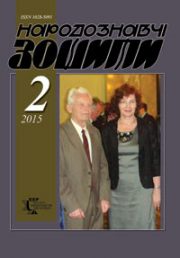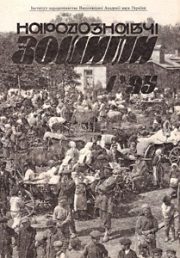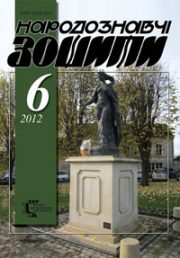The Ethnology Notebooks. 2023. № 6 (174), 1430—1436
UDK 271.4-726.3(477.83-22):94(477)”193/195″
DOI https://doi.org/10.15407/nz2023.06.1430
TARAS Yaroslav
- ORCID ID: https://orcid.org/0000-0001-7241-9466
- Doctor of Historical Sciences, Professor,
- Institute of Ethnology of the National Academy of Sciences of Ukraine,
- Head of the modern ethnology department,
- 15, Svobody Avenue, 79000, Lviv, Ukraine,
- Lviv Polytechnic National University,
- department of architecture and design, Professor,
- 12, Bandera street, 79013, Lviv, Ukraine,
- Contacts: e-mail: etnomod@ukr.net
Abstract. Father Mykola Matkovskyi belongs to the priests who experienced the most tumultuous years of Ukrainian history in the first half of the 20th century: national revival, the First World War, the Ukrainian-Polish War, the Second World War, repressions against the church that took place during 1939—1957.
The scientific study and understanding of the pastoral activity of Father Mykola Matkovsky of Duliby is relevant and important for understanding the processes that took place in the socio-political and spiritual life of the Galician village in the first half of the 20th century. Studying the history of priests in each village during the 19th and 20th centuries will give us an opportunity to understand how they influenced the processes of national identity formation in the villages of Western Ukraine, and that is why we had and still have problems with the Russian Church in Ukraine during the years of independence.
The purpose of the publication is to follow the life path of a priest who served under the Austro-Hungarian Empire, the Second Polish-Lithuanian Commonwealth (the interwar period of the 20th century), and the Soviet Empire.
The object of the research is the rural Galician parish priests of the first half of the 20th century, the subject is the spiritual, socio-political and nation-building activity of Father Mykola Matkovskyi, the parish priest of the village Duliby, Stryi district.
The main task is to find out and reconstruct the unknown facts of the biography and life of Mykola Matkovskyi; characterize his activity in Ukrainian public organizations during the period of existence of the Western Ukrainian People’s Republic, German and Soviet occupation of Western Ukraine; to show how the Soviet occupation affected the personal life of Fr. Matkovskyi.
The methodological basis of the study consists of the principles of historicism, consistency, scientific pluralism, systematicity and comprehensiveness. General historical methods — historical-comparative, historical-typological, historical-systemic — were used to clarify the life activity of the priesthood in socio-political systems.
Keywords: father Mykola Matkovskyi, Stryi region, Duliby village, Ukrainian Greek-Catholic Church, «Prosvita» Society, Ye. Olesnytskyi, О. Bachynska.
Received 30.10.2023
REFERENCES
- Central State Historical Archive of Ukraine in Lviv. Fund 201. Description 1 в. Case 583 [in Ukrainian].
- Delyatinsky, R. (2017). Stanislaviv Diocese of the Greek Catholic Church in the social life of Galicia (1885—1946): dissertation for the scientific degree of candidate of historical sciences: specialty 07.00.01. Ivano-Frankivsk [in Ukrainian].
- Central State Historical Archive of Ukraine in Lviv. Fund 201. Description 5. Case 295, 416, 245 [in Ukrainian].
- Central State Historical Archive of Ukraine in Lviv. Fund 201. Description 1 в. Case 593[in Ukrainian].
- Olesnytsky, Ye. (2007). Pages from my life (reprint edition in 1935 with additional material). Stryi: Schedryk [in Ukrainian].
- Borodavka, Yu. (1992). The first agricultural exhibition in Stryi. In one’s own house, one’s own truth: Stryi History Pages (Pp. 12—17). Kyiv; Stryi [in Ukrainian].
- Central State Historical Archives, Lviv. Fund 348. Description 1. Case 2350 [in Ukrainian].
- Kachor, A. (1992). The role of Clergy and the Church in the economic revival of western Ukraine. Winnipeg, Canada: Published by The Ukrainian Academy of Arts and Sciences [in Ukrainian].
- Shankowsky, L. (1990). History outline of the Stryi region. The Stryi Region: Stryi, Skole, Bolekhiv, Dolyna, Rozhnitiv, Zhuravno, Zhydachiv, Mykolaiv n/Dn. (Vol. 1, pp. 69—192). New York: Stryishchyna Committee [in Ukrainian].
- (1919, 18 january). Stryiskyi visnyk [in Ukrainian].
- Shankivsky, L. (2012). Stryi and Stryi region in the liberation war of 1918—1920. The independent cultural journal «Ї», 70. Retrieved from: http://www.ji.lviv.ua/n70texts/Shankivskyj_Stryj_u_vijni_18-20.htm [in Ukrainian].
- (1929). Zhinocha dolia (Part 16, p. 6) [in Ukrainian].
- Khanas, Z. (2007). Essays on the history of the women’s movement of the Stryi region. Stryi: Ukrpol Publishing House [in Ukrainian].
- Kuziv, I. (1990). On the way to building a cooperative (To the history of the District Union Cooperative in Stryi). The Stryi Region: Stryi, Skole, Bolekhiv, Dolyna, Rozhnitiv, Zhuravno, Zhydachiv, Mykolaiv n/Dn. (Vol. 2, pp. 332—344). New York: Stryishchyna Committee [in Ukrainian].
- Kumor, B. (1996). Church History (Vol. 8). Lublin [in Polish].
- Pasika, E. (1941). First District Meeting of the Ukrainian Revolutionary Cords of Prosvita reading rooms. Stryiski visti, 4 [in Ukrainian].
- (1941). Member. Performance of the play «About what the sawdust rustled». Stryiski visti, 28 [in Ukrainian].
- Drobinyak, D. (1941). Foundation of the squad of the «Sich» society in Duliby. Stryiski visti, 12 [in Ukrainian].
- Khavliuk, M. (2000). A life dedicated to God and Ukraine. Stryi [in Ukrainian].






